Biden says he ‘often strongly’ disagreed with Kissinger after diplomat’s death
Henry Kissinger leaves behind a complex legacy, remembered as a master of global politics by some and an alleged war criminal by others
Your support helps us to tell the story
From reproductive rights to climate change to Big Tech, The Independent is on the ground when the story is developing. Whether it's investigating the financials of Elon Musk's pro-Trump PAC or producing our latest documentary, 'The A Word', which shines a light on the American women fighting for reproductive rights, we know how important it is to parse out the facts from the messaging.
At such a critical moment in US history, we need reporters on the ground. Your donation allows us to keep sending journalists to speak to both sides of the story.
The Independent is trusted by Americans across the entire political spectrum. And unlike many other quality news outlets, we choose not to lock Americans out of our reporting and analysis with paywalls. We believe quality journalism should be available to everyone, paid for by those who can afford it.
Your support makes all the difference.Henry Kissinger, a Holocaust survivor who became the US’s most influential – and divisive – diplomat, has died at the age of 100.
Kissinger leaves behind a complex legacy, remembered as a master of global politics by some and an alleged war criminal by others.
Born in Bavaria, his family fled to New York City to escape the Holocaust – an experience that would go on to shape his future foreign policy work.
As President Richard Nixon’s National Security Advisor, Kissinger was responsible for negotiating the US’s exit from the unpopular Vietnam War. He won a Nobel Peace Prize for his diplomatic work – but his legacy was then tainted when it emerged he had authorised the secret carpet-bombing of neutral Cambodia, which killed at least 150,000 civilians.
Beyond his diplomacy work, Kissinger briefly enjoyed a reputation as an unlikely ladies’ man and social butterfly in Washington DC, dating several stars of the time before marrying his second wife Nancy – who survives him.
Reactions from political and diplomatic allies and foes poured in after his death on Wednesday, with former president George W Bush remembering “his wisdom, his charm, and his humour”.
Joe Biden on Thursday said that he had “often strongly” disagreed with Kissinger but praised his “fierce intellect.”
Revisiting Anthony Bourdain’s long-time hatred of Henry Kissinger
Since news broke of the death of former US diplomat Henry Kissinger, political and social commentators have been sharing their passionate reflections on his life and career.
Kissinger died aged 100 on Wednesday (29 November), leaving behind what many are describing as a complicated legacy.
One cultural figure who felt strongly about Kissinger was the chef, food writer and TV host Anthony Bourdain.
Before his death in June 2018, the No Reservations star had expressed disparaging views of President Nixon’s former secretary of state, having spent a significant time in southeast Asia.
Read the full story:

Revisiting Anthony Bourdain’s long-time hatred of Henry Kissinger
Late chef and author was no fan of the Nixon-era secretary of state
Cambodia scholars remember ‘controversial’ figure
Cambodian scholars have a different take on the late diplomat to that of many world leaders, instead remembering Kissinger for his controversies.
The head of the independent Documentation Center of Cambodia, Youk Chhang, described Kissinger’s legacy as “controversial.”
“Henry Kissinger’s bombing campaign likely killed hundreds of thousands of Cambodians — and set (a) path for the ravages of the Khmer Rouge,” Sophal Ear, a scholar at Arizona State University who studies Cambodia’s political economy, wrote on The Conversation.
“The cluster bombs dropped on Cambodia under Kissinger’s watch continue to destroy the lives of any man, woman or child who happens across them,” Sophal Ear wrote.
A Rolling Stone magazine headline also referred to Kissinger as a “war criminal”.
“Henry Kissinger, war criminal beloved by America’s ruling class, finally dies,” it reads.
How Kissinger’s influence was felt over 11 administrations
It was 1968 when President-elect Richard Nixon tapped Kissinger to be his National Security Advisor – paving the way for him to influence 11 presidential administrations over several decades in and out of foreign policy.
When he and Nixon took office in January 1969, the most immediately pressing problem they faced was the Vietnam War – the failures of which ultimately became synonymous with Kissinger.
After Nixon secured a second term in 1972, he took the unprecedented step of making Kissinger his secretary of state (the first foreign-born American to hold that office) while retaining him as national security adviser.
During his tenure, Kissinger made a series of controversial decisions. He supported a failed covert operation to kidnap Chilean General René Schneider in the hopes of preventing President Salvador Allende’s inauguration.
During the 1973 Arab-Israeli War (also known as the Yom Kippur War) Kissinger acted quickly to secure American aid to Israel – a pivotal intervention in the conflict but one that inspired the Organisation of Petroleum Exporting Countries to boycott trade with the US in retaliation, creating an economic crisis at home.
Though the Watergate scandal forced Nixon’s resignation in 1974, Kissinger remained secretary of state under Gerald Ford.
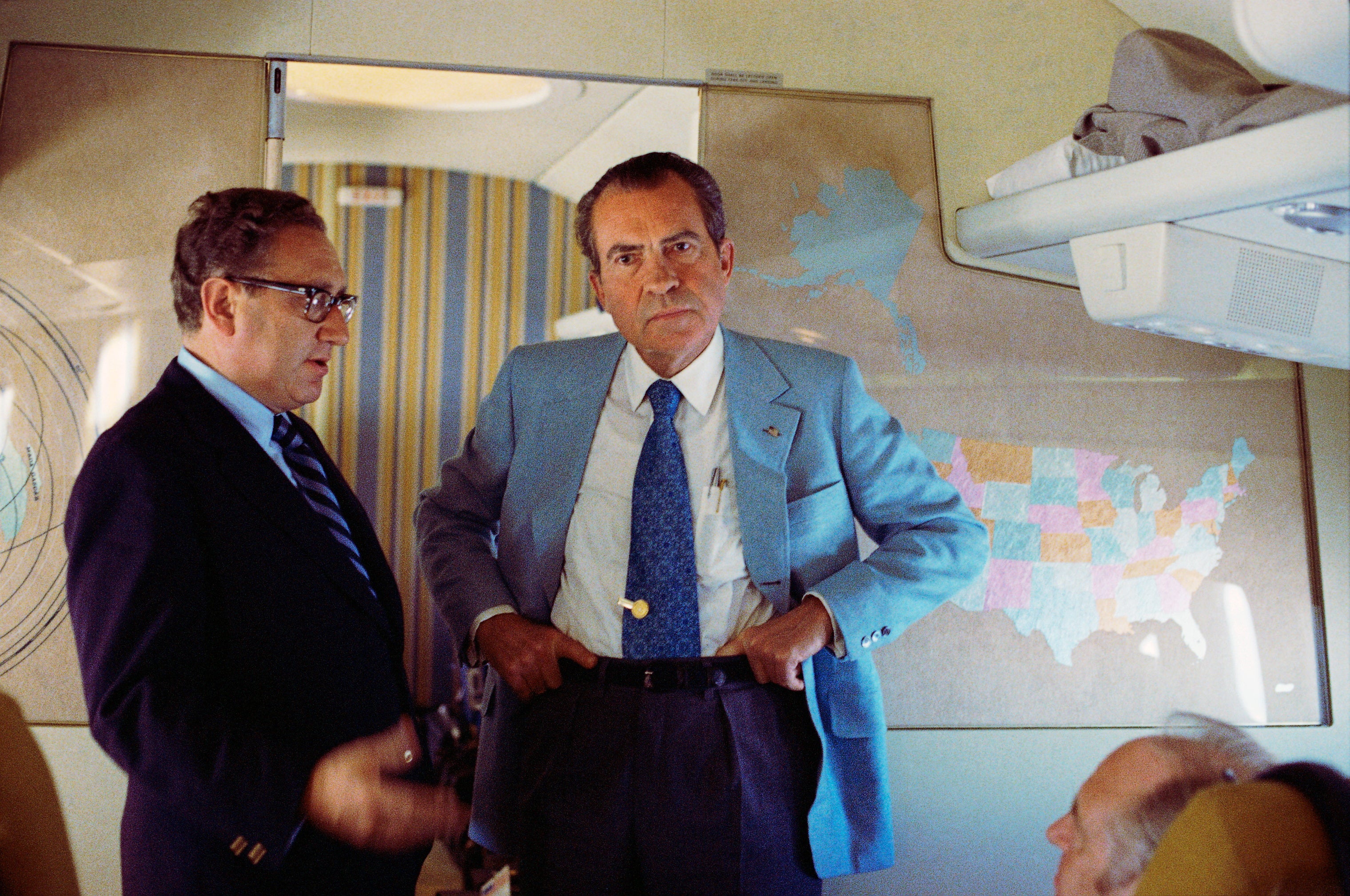
The duo continued to pursue a detente with the USSR and China and the period brought the Helsinki Accord of August 1975.
When Kissinger left the White House in November 1976, he found himself surplus to requirements at the young age of 54, albeit with a Presidential Medal of Freedom around his neck. But he continued to make himself available to every succeeding president.
Under the Reagan administration, he was appointed to the head a national commission on Central America in 1983 and served on the President’s Foreign Intelligence Advisory Board and the Commission on Integrated Long-Term Strategy.
During George W Bush’s presidency, Kissinger advised him on the aftermath of 9/11 and the Iraq War, supporting the 2003 invasion.
He offered advice to Donald Trump and George W Bush and helped maintain a relationship between China and the Biden administration.
VOICES: We should look back on Kissinger not just as a ‘war criminal’ – but as a man who sought peace
“Henry Kissinger ought to be most remembered for a quip about the long, merciless and futile war between the Saddam Hussein’s Iraq and the ayatollahs running Iran in the 1980s: “It’s a pity both sides can’t lose”.
Kissinger should be celebrated for that remark because it epitomises everything that made Kissinger the force and influence on the world that he was for most of his life. Cynical, direct, sophisticated in thought but plain in presentation, his upsum of the Iran-Iraq war was completely correct – the world would have been better off without either of those nasty regimes.
Yet the sentiment was tinged with realism – the regret that such an ideal state of affairs wasn’t going to transpire. Kissinger was always a man to approach the world as it was, not as we would wish it to be. The remark thus showcased his finest of attributes – a rare gift for analysis and a clarity of thought that is glimpsed rarely in those in power. He was the greatest of strategic thinkers, a man who could understand and reframe “the big picture”, and secure some benefit for his country and for mankind.
We should look back on Kissinger not just as a “war criminal” – a charge with some merit that does need to be confronted – but as a man who sought and secured peace.”
Sean O’Grady writes:

Kissinger was not just as a ‘war criminal’, but a man who sought peace | Sean O’Grady
The former secretary of state leaves a complicated legacy, writes Sean O’Grady. But the world could use his level of statecraft now
Who was Henry Kissinger married to?
Henry Kissinger was married twice during his lifetime.
In 1949, Kissinger married his first wife, Ann Fleischer. The couple had two children, Elizabeth, born in 1959 and David, born in 1961. Kissinger and Ann divorced in 1964.
In 1974, Kissinger married Nancy Maginnes, whom he met while working for former New York Governor Nelson Rockefeller. Nancy was a longtime aide to Rockefeller – someone whom Kissinger was close to as both a friend and colleague.
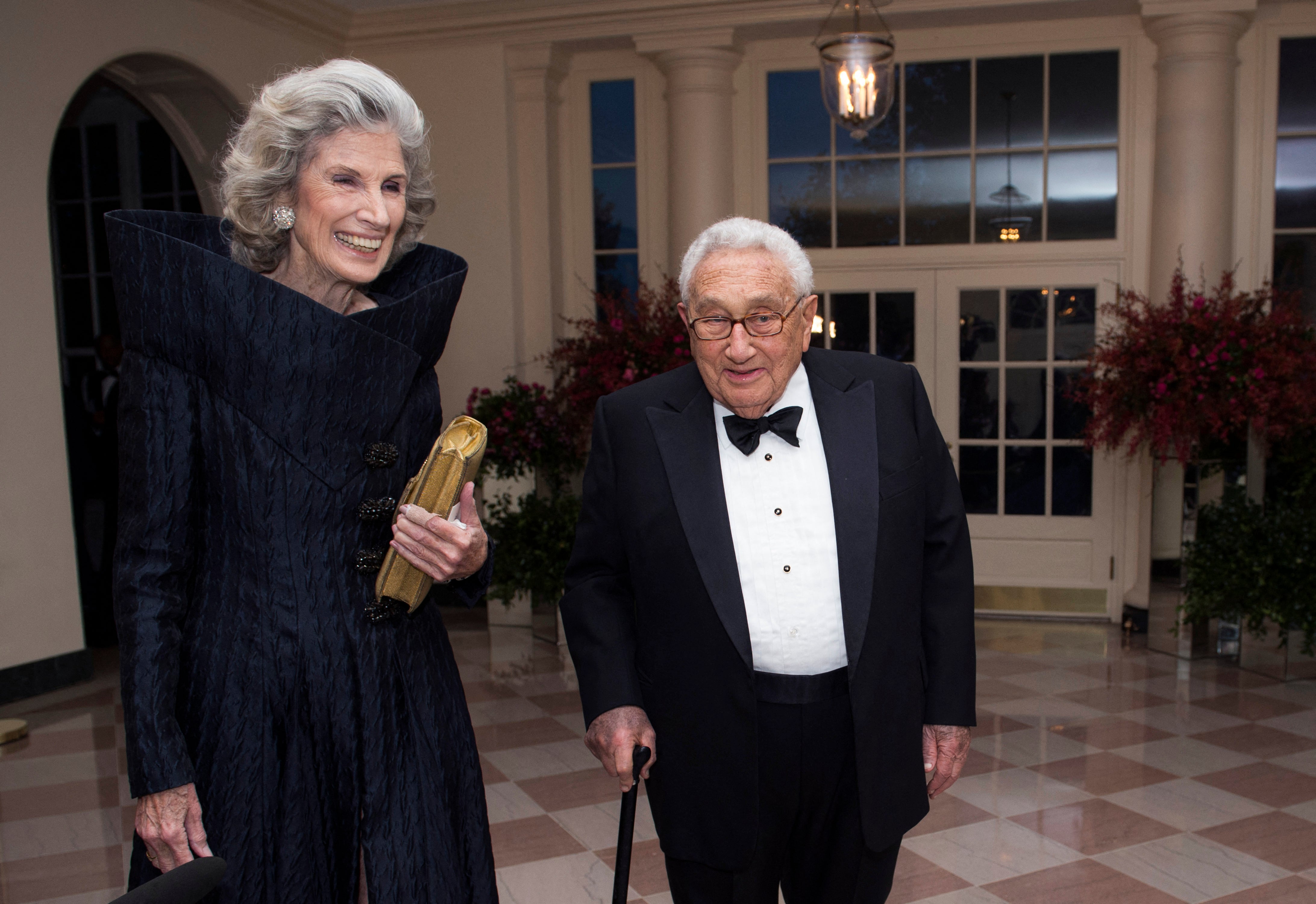
Henry Kissinger advised 12 presidents throughout his lifetime
Henry Kissinger will be remembered as a divisive, but central, figure in American politics – having remained close to the White House across 12 different presidencies during his lifetime.
In the late 1940s, Kissinger formed relationships with several government agencies and then-president John F Kennedy by advising them on foreign affairs while serving as a professor at Harvard University.
He took on a more official role as National Security Advisor to former president Richard Nixon in 1968 and quickly established himself adjacent to the White House.
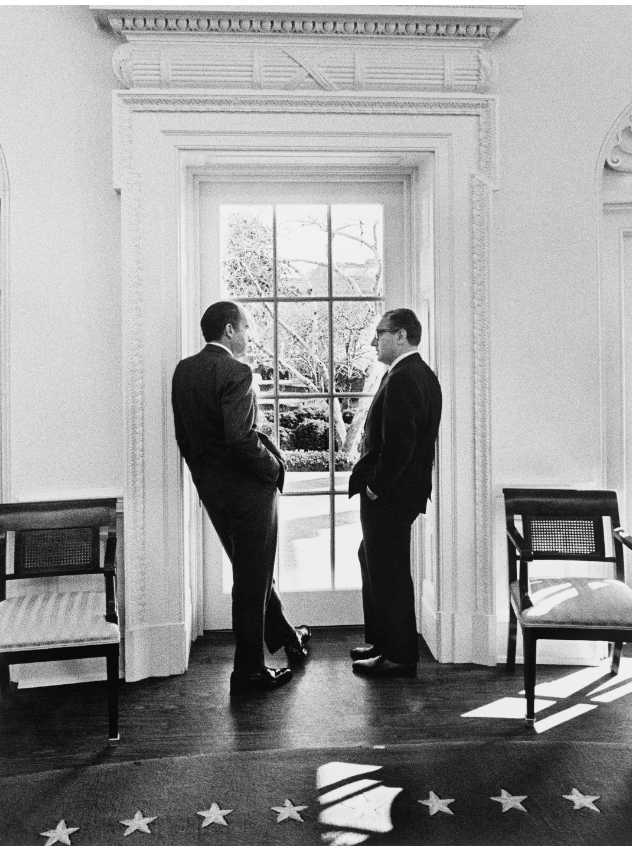
Though Kissinger ceased his official secretary of state title after former president Gerald Ford’s presidency ended, his expertise was never far from the presidents that succeeded him.
He assisted Jimmy Carter, Ronald Reagan, George H W Bush, Bill Clinton, George W Bush, Barack Obama, Donald Trump and President Joe Biden.
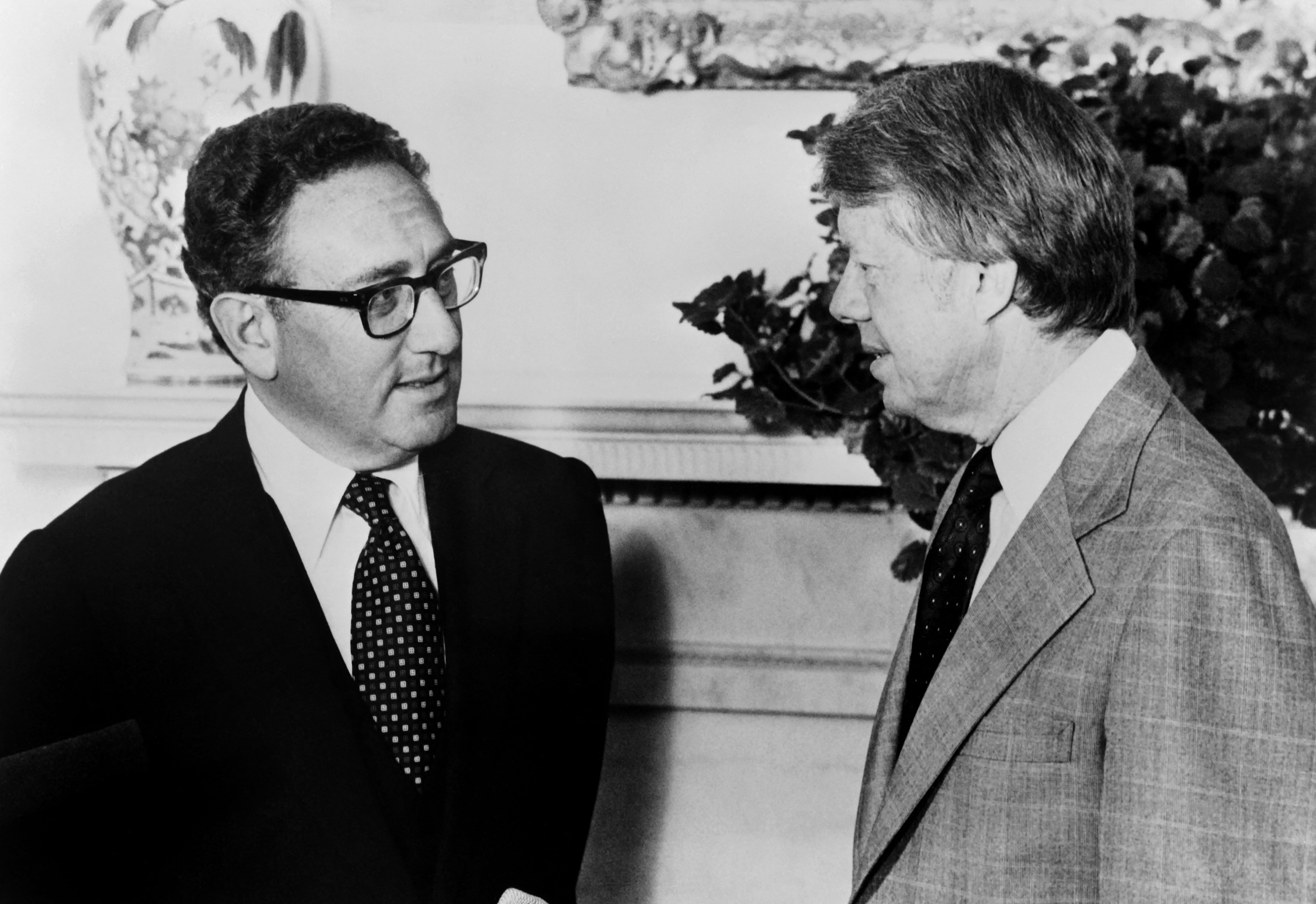
GOP Senators remember Henry Kissinger
Upon hearing the news of former secretary of state Henry Kissinger’s death, various Republican Senators issued statements remembering the divisive political figure and praised him for his role in shaping US foreign policies.
Minority Leader Mitch McConnell called Kissinger “a titan among America’s most consequential statesman”.
Iowa Senator Chuck Grassley said he was “sorry to hear of the passing of Henry Kissinger” and complimented Kissinger’s “public service” and “excellent books on world affairs.”
South Carolina Senator, and former presidential candidate, Tim Scott remembered Kissinger’s “consequential impact on American foreign policy” calling Kissinger’s death an “incredible loss” for the US.
Senator Lindsey Graham reflected on his “good friend” Kissinger’s role in advising numerous presidents.
Utah Senator Mitt Romney said America was fortunate for the “diplomacy, wisdom and love of freedom” that Kissinger brought with him.
West Virginia Senator Shelley Moore Capito posted a photo with Kissinger, saying the US had lost “an icon.”
How Henry Kissinger’s Holocaust escape shaped his foreign policy
Henry Kissinger’s life could have gone very differently.
Born in Germany in 1923 to Orthodox Jewish parents, Heinz Alfred “Henry” Kissinger spent his formative years living under Nazi rule.
At just 15 years old, Kissinger’s family made a crucial decision that spared him from the Holocaust – and paved the way for him to become one of the most powerful diplomatic figures in America.
In August 1938, not long before Kristallnacht, Kissinger and his sought refugee in New York City.
And while the escape saved him and his immediate family from the Holocaust, at least 13 of his close relatives stayed behind and were killed in Nazi concentration camps.
Rachel Sharp reports:
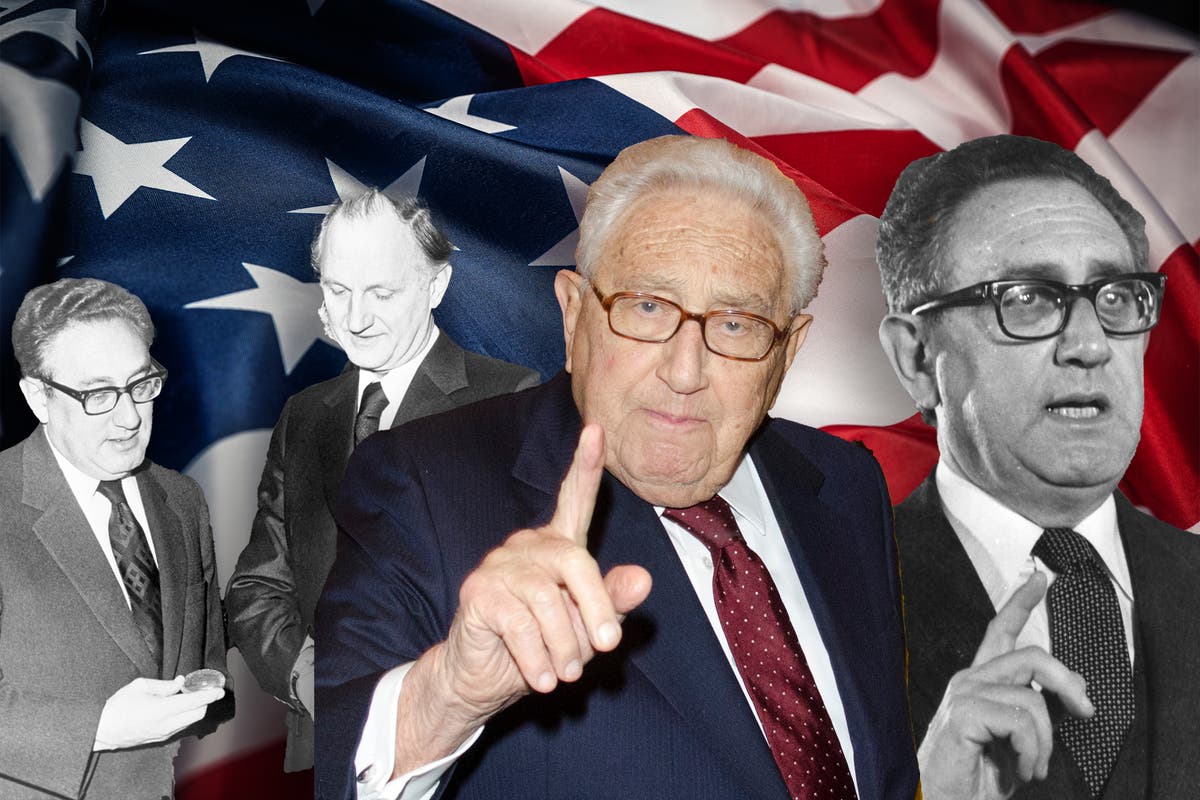
How Henry Kissinger’s Holocaust escape shaped his powerful, polarising foreign policy
Master diplomat or war criminal, there’s no denying that Kissinger’s story is one of the American dream: a tale of a boy who fled Nazi Germany to become one of the most powerful men in US and world politics. Rachel Sharp reports
Henry Kissinger’s Nobel Peace Prize stirred controversy
In 1973, Henry Kissinger was awarded the Nobel Peace Prize for his efforts in negotiating the Paris Peace Accords to end the Vietnam War – but in the years after it was awarded the award began to lose its initial meaning.
The purpose of awarding Kissinger with the prestigious award was for the negotiations he engaged in with South Vietnam and North Vietnam to end the war. However, just two years later, when the fall of Saigon happened, Kissinger attempted to return the award citing the failure in the negotiations.
From then until as recently as this year, it has been revealed that the Nobel Peace Prize committee members were fully aware Kissinger’s negotiations likely would not bring an end to the Vietnam War and yet still awarded him the prize.
Kissinger’s Israel warning just before his death revealed
Former top US diplomat Henry Kissinger warned that the war in Israel and Gaza could engulf the rest of the Arab world and throw the international status quo into chaos, during his final interview.
Kissinger died on Wednesday aged 100.
He sat for an interview on German television just days after the Hamas terror attack on 7 October, during which he said he believed there had to be “some penalty” for the bloodshed, and rejected calls for peace in the region, according to Insider.
“Of course, the first instinct is to bring back peace but you can’t make concessions to people who have declared and demonstrated by their actions that they cannot make peace,” Kissinger said.
Israel’s response to Hamas’s 7 October attack — which left 1,400 Israelis dead — has been an unrelenting bombing campaign. More than 10,000 Palestinians have been killed since the 7 October attack, and millions more have been displaced.
When asked how he would deal with the hostages taken by Hamas, Kissinger said he couldn’t provide a full answer because he was not the one making the final decision, but he did offer some speculation.
“Theoretically and conceptually, I would say that we cannot yield to that,” he said.





Join our commenting forum
Join thought-provoking conversations, follow other Independent readers and see their replies
Comments